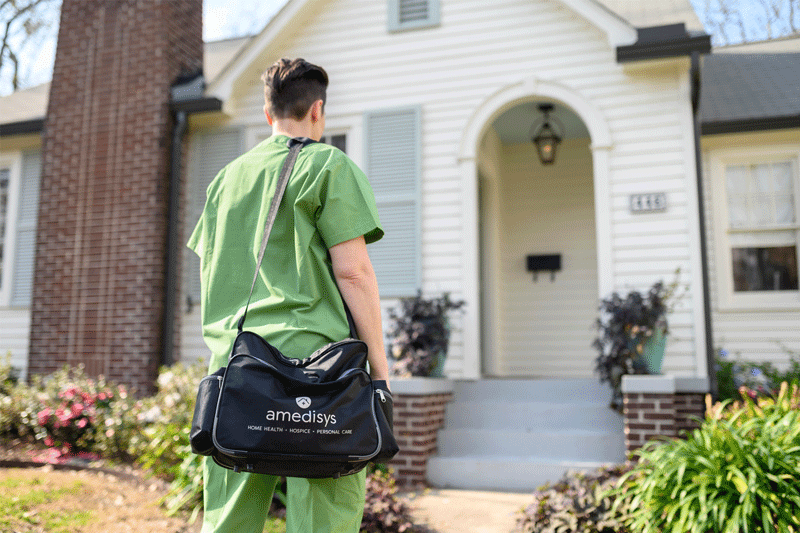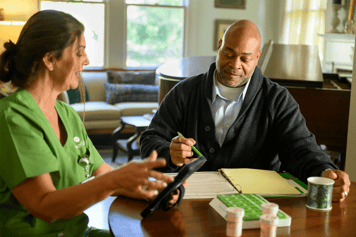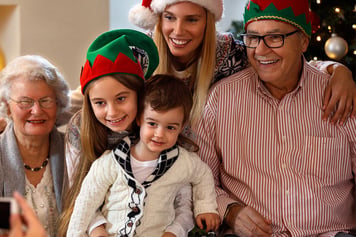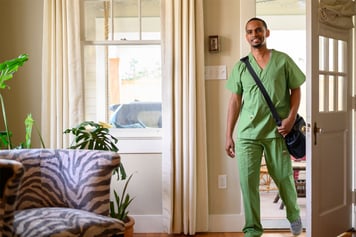Every day they visit patients in their homes. They drive from one house or apartment to another, sometimes facing traffic jams and snowstorms or even hurricanes, rather than stay in a single place, all while dedicating their best to their patients. Home health and hospice nurses are a breed apart, functioning differently from nurses in hospitals, physician offices, nursing homes and other practice settings. And we should celebrate everything they accomplish.
We here at Amedisys know all about home health and hospice nurses. It was a registered nurse who founded our company in 1982. Today, we employ more than 6,800 nurses. With 521 care centers in 37 states and D.C. – and in partnership with 110,000 physicians and nearly 3,000 hospitals nationwide – Amedisys delivers care to the doorsteps of some 470,000 patients in need every year. Every day we receive letters from patients and families expressing gratitude for the nurses providing their care.
[action 1]
To all our nurses and clinicians across the country, thank you. Here’s why you should join us in recognizing these heroes.
First, never before in history have we so needed home health nurses. With Americans living longer than ever, they’re also sicker than ever. Some 60% of those age 65+ have at least one chronic condition such as COPD, congestive heart failure, cancer, dementia and diabetes, according to a 2017 RAND Health study – and 42% have multiple chronic conditions.
All of that is before COVID-19. The essential need for nurses has never been more apparent than since the global pandemic, and our people have shown incredible courage and resilience, continuing to show up for our patients and families every day ready for the challenge.
Our average patients are 75 years old, often the sickest of the sick, and thus the most vulnerable. They’re seeing multiple specialists and taking an average of 11 medications. Even so, older Americans want to age in place—at home, where they want to be most. They prefer the dignity that comes with living independently.
Second, in-home nurses operate independently. Out on the road, they have no immediate access to other healthcare practitioners down the hall and stand ready to adapt to any situation and solve any problem. They are largely responsible, too, for communicating effectively with patients, physicians, primary caregivers, families and anyone else directly involved in patient care. Their care is the glue that holds it all together!
Third, delivering healthcare in the home as a nurse is about as personal as healthcare gets. Our clinicians get in their cars, pull equipment out of the trunk and go into a patient’s home and land on “their turf.” They arrive at homes without knowing what they will find, or how patients are going to be faring. There, they see how patients are living—what they’re eating, whether they have a spouse or a pet as a companion, and what’s in the medicine cabinet.
They then provide patients the most intimate, one-on-one attention. Visiting for weeks or even months, they get to know patients on an entirely different level. They build a history together and become part of their story. They learn more than the baseline vital signs such as blood pressure and blood oxygen level. They also find out about the family—the ever-concerned husband, the anxious daughter from out of state.
Their responsibilities often span the physical, the psychological and the spiritual. As they bring to the table clinical excellence, they also deliver compassion—a smile, a sympathetic ear, a pat on the shoulder. They build confidence, teach independence and empower patients to take control of their own illness. They are nurses but also guests, trusted advisors, teachers and friends all rolled into one. Our patients may feel isolated and lonely, especially in quarantine, and are glad to have some company, virtual or otherwise.
Fourth, they get to see long-term results. After their care, and the care of the entire team, patients often move better, eat better, breathe better and speak better. They may now feed themselves, dress themselves, bathe themselves and get back to babysitting grandchildren. A woman once unable to walk may once again tend to the hydrangeas in her backyard garden. A man who lost the power of speech may now talk again with his next-door neighbor. Hospice patients and their family may seem more peaceful, more confident in their abilities and less afraid.
Thanks largely to our heroes, seniors are now better prepared than ever to live safely and independently at home for perhaps longer than they expected. As a result, they’re more likely to avoid admission and readmission to hospitals and nursing homes. No wonder patients so often call them “angels.”
Our nurses stand on the doorstep to a home and ring the bell or knock. The door swings open to let them in. And that’s where it all starts. Here at Amedisys, home health and hospice nursing is more than a job or a profession—caregiving is our calling. Will you answer the call?
To join our family of caregivers, look for open jobs.





